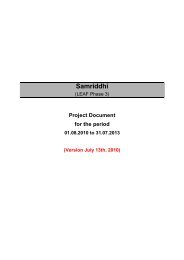FINAL REPORT
FINAL REPORT
FINAL REPORT
You also want an ePaper? Increase the reach of your titles
YUMPU automatically turns print PDFs into web optimized ePapers that Google loves.
in Ulaanbaatar, and in different libraries of Ulaanbaatar and Khovd khot (Khovd Ikh Surguuli)<br />
were collected, analyzed and evaluated (see Bibliography).<br />
During the evolution of the statistical data which the team officially got from the Sum and<br />
Aimag administration different figures were provided for the same subject. This shows that<br />
the reliability if statistical data is limited thus statistical data which seemed to be wrong and<br />
were notused.<br />
4.3(Participatory) Observation<br />
During a short preparative trip to the study area in May 2006 the team members observed the<br />
socio-economical, and environmental situation within the four investigated Sums. Based on<br />
these observations a standardized questionnaire was elaborated. During the field work in June<br />
and July 2006 the team members could carry out more detailed participatory observations<br />
within the farming communities. These results have been discussed among the team members<br />
resulting in new questions and suggestions about how to improve irrigation and farming<br />
practices in an ecologically adapted manner resulting in an amelioration of the livelihood of<br />
farming and agro-pastoralist households. An exchange of views has also been carried out with<br />
the representatives of the local administration resulting in fruitful discussions about future<br />
perspectives of irrigated farming.<br />
4.4Expert Interviews<br />
Before and during the fieldwork, research team members have met with Government officials<br />
and experts of the Aimag, Sum, and Bag administration as well as with representatives of the<br />
Khar Us Nuur-National Park Administration and a private hydrological engineering company<br />
(See Annex:List of People Met).<br />
4.5 Interviews with Standardized Questionnaires for Farming and Agro-Pastoral<br />
Households<br />
A standardized questionnaire with a mixture of quantitative and qualitative questions was<br />
used in order to get a detailed insight into the present demographic, socio-economic, ethnical,<br />
marketing, legal, institutional and ecological situation as well as into behaviors and attitudes<br />
of the farming population and their living and production conditions and the impact of their<br />
activities on thenatural environment. Around two hundred interviews were carried out.<br />
14
















